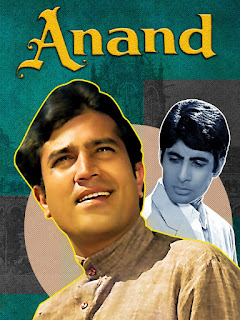A Song Well Kept
 |
| Image source: Amazon Prime Video |
The year is 1970. Hrishikesh Mukherjee is planning to make a movie on a terminally ill cancer patient. He chooses Kishore Kumar as the lead actor and Mehmood in the supporting role. He goes to Kumar's house to give him an invite to join the film together with a handwritten script. But Kumar's gate-keeper refuses to let him in. He has been told to "drive away a Bengali if he ever comes!"–Mukherjee becomes the misunderstood bait. Dejected, he reaches out Rajesh Khanna and Amitabh Bachchan to star in his magnum opus, Anand. Mehmood has apparently dropped out after Kishore Kumar's exit.
The film hits the theatres in 1971 to applause, acclaim, Filmfares and sobs. Kaka has put up a brilliant and resilient show of Anand babu, who is terminally ill and on one last dopamine and altruistic rush. Bachchan gets a rep-upgrade after Saat Hindustani, now he is remembered as the no-nonsense, hardworking, but equally vulnerable Dr Bhasker.
Gulzar turns out to be the Midas of the film. Everything from the dialogues of the film to the lyrics of the soundtrack fit and flow seamlessly into the film. Salil Chowdhury is equally worthy of the credit. His masterful utilisation of the melancholy voices of Mukesh and Manna Dey would make the soundtrack, particularly the song, "Kahin Door Jab Din Dhal Jaaye", a favourite of Rajesh Khanna–this, among all the beautiful Kishore songs, picturised on the first superstar.
Coming back to Kishore-da again. As aforementioned, he mistakenly dropped out of the film, and was not considered for the soundtrack either. Weird, I believe, because if we choose Anand as a mid-point between two of Mukherjee's classics, Padosan and Golmaal (ignoring Chupke Chupke for the time being), the soundtracks are Kishore-intensive, or at least made memorable by him. Let us focus on Golmal now.
The Anand duo of Mukherjee and Gulzar reunite. Gulzar wins another Filmfare for "Aane Wala Pal", equally brilliantly sung by Kishore Kumar in a Sinatra-like swing. A-ha. Kishore Kumar returns!
But consider this song, its lyrics and singer. Particularly, this stanza:
"एक बार वक़्त से,
लमहा गिरा कहीं
वहाँ दास्तां मिली
लमहा कहीं नहीं
थोड़ा सा हँसाके
थोड़ा सा रुलाके
पल ये भी जाने वाला हैं
आने वाला पल..."
Doesn't it, and the entire song for that matter project imagery and allegory to the limited days of a terminally ill patient? Wouldn't this song have also gelled well with Anand? (except that the music here is by R. D. Burman and not Salil Chowdhury)
Imagine! This song could be one of the stock Rajesh Khanna-Kishore Kumar hits. Kaka could have sung this song on the keyboard in front of Bachchan and his guests, instead of "Maine Tere Liye". We would remember this song in a more melancholic manner then.
Imagine! What if Gulzar had already written this song in 1971 for this Rajesh Khanna movie, keeping Kishore-da in his mind to sing for Khanna? As fate would have it, Salil Chowdhury chose Manna Dey and Mukesh for Khanna's voice and not Kishore, deeming the former two more suitable for the melancholic character of the film. What if Gulzar shelved this song for almost a decade as if reserving it for Kishore-da? And for a Kishore Kumar film, perhaps? Imagine Kishore Kumar acting out this song in Anand!
Thesis statement: "Aane Wala Pal" sounds like one of those golden rejected songs, which had the essence of Anand and his alter-ego reeking with the fear and despair of imminent death.
It's just a fancy, Bollywood fan-fiction. Make of it whatever you want. But what if!

Comments
Post a Comment